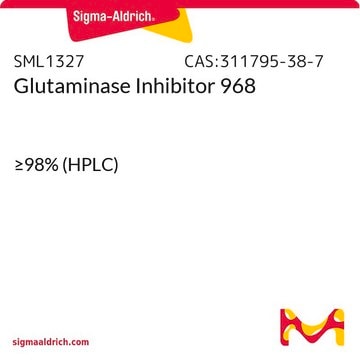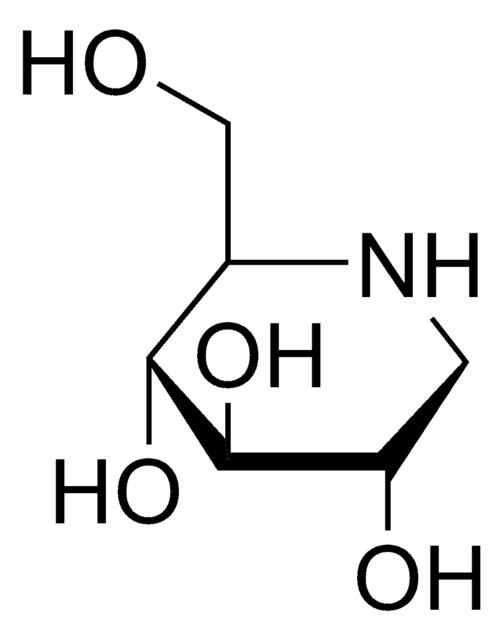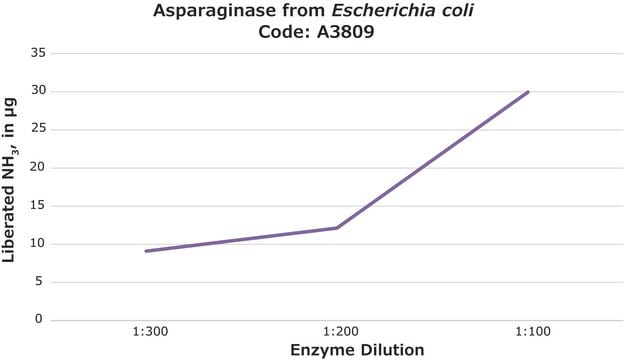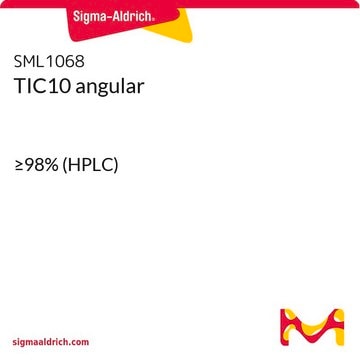D2141
6-Diazo-5-oxo-L-norleucine
>95% (TLC), suitable for ligand binding assays
Synonyme(s) :
(S)-2-Amino-6-diazo-5-oxocaproic acid, DON
About This Item
Produits recommandés
product name
6-Diazo-5-oxo-L-norleucine, crystalline
Pureté
>95% (TLC)
Niveau de qualité
Forme
crystalline
Technique(s)
ligand binding assay: suitable
Couleur
light yellow
Pf
145 °C
Spectre d'activité de l'antibiotique
neoplastics
Mode d’action
enzyme | inhibits
Température de stockage
−20°C
Chaîne SMILES
N[C@@H](CCC(=O)C=[N+]=[N-])C(O)=O
InChI
1S/C6H9N3O3/c7-5(6(11)12)2-1-4(10)3-9-8/h3,5H,1-2,7H2,(H,11,12)/t5-/m0/s1
Clé InChI
YCWQAMGASJSUIP-YFKPBYRVSA-N
Vous recherchez des produits similaires ? Visite Guide de comparaison des produits
Description générale
Application
Actions biochimiques/physiologiques
Mention d'avertissement
Danger
Mentions de danger
Conseils de prudence
Classification des risques
Acute Tox. 3 Dermal - Acute Tox. 3 Inhalation - Acute Tox. 3 Oral
Code de la classe de stockage
6.1C - Combustible acute toxic Cat.3 / toxic compounds or compounds which causing chronic effects
Classe de danger pour l'eau (WGK)
WGK 3
Point d'éclair (°F)
Not applicable
Point d'éclair (°C)
Not applicable
Équipement de protection individuelle
Eyeshields, Faceshields, Gloves, type P2 (EN 143) respirator cartridges
Certificats d'analyse (COA)
Recherchez un Certificats d'analyse (COA) en saisissant le numéro de lot du produit. Les numéros de lot figurent sur l'étiquette du produit après les mots "Lot" ou "Batch".
Déjà en possession de ce produit ?
Retrouvez la documentation relative aux produits que vous avez récemment achetés dans la Bibliothèque de documents.
Les clients ont également consulté
Articles
Sigma article discusses tumor cell metabolic pathways, focusing on aerobic glycolysis and mitochondrial activity.
Sigma article discusses tumor cell metabolic pathways, focusing on aerobic glycolysis and mitochondrial activity.
Sigma article discusses tumor cell metabolic pathways, focusing on aerobic glycolysis and mitochondrial activity.
Sigma article discusses tumor cell metabolic pathways, focusing on aerobic glycolysis and mitochondrial activity.
Notre équipe de scientifiques dispose d'une expérience dans tous les secteurs de la recherche, notamment en sciences de la vie, science des matériaux, synthèse chimique, chromatographie, analyse et dans de nombreux autres domaines..
Contacter notre Service technique













